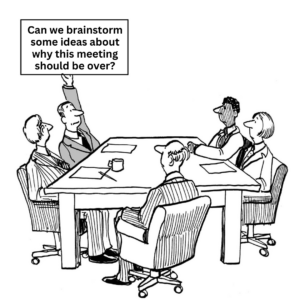Meetings Don’t Have to be Miserable! Planning to Improve Staff Engagement
by Robyn Kelton, M.A.
Download
This document may be printed, photocopied, and disseminated freely with attribution. All content is the property of the McCormick Center for Early Childhood Leadership.
Not-so-fun fact: 17% of employees would rather watch paint dry than attend a status meeting. 1
If staff in your program are not jumping for joy when you announce an upcoming staff meeting, don’t worry—they are in good company. In fact, many of us would rather do just about anything else than sit in a meeting, often because we perceive the meetings we are required to attend as unproductive, irrelevant, and frustrating.2 It should come as no surprise then that many meeting attendees admit they don’t actively participate in required meetings. One study, for example, found that 73% of meeting attendees reported using meeting time to do unrelated work, and 90% reported daydreaming during meetings.2 Even more worrisome is that many meeting leaders seem to have opposite perspectives and report that the meetings they lead are very productive.3 This suggests a disconnect, where leaders overestimate the effectiveness of their meetings while attendees are scrolling on their phones and daydreaming about dinner.
 My colleague Wendy Connell and I recently created a new self-paced online module for leaders called, Communication in the Workplace: Crafting Connections, Managing Meetings, and Resolving Rifts. Along with exploring communication styles and conflict resolution, the module examines how to transform meeting dread into exciting and productive opportunities for staff to feel seen and heard. To do this, we share several strategies for leading more effective meetings. In doing so, we also address a few common meeting challenges and provide strategies to combat the issues. Below is one example of a common challenge with meetings, lack of engagement and some of the strategies we share in the module to increase staff investment and participation.
My colleague Wendy Connell and I recently created a new self-paced online module for leaders called, Communication in the Workplace: Crafting Connections, Managing Meetings, and Resolving Rifts. Along with exploring communication styles and conflict resolution, the module examines how to transform meeting dread into exciting and productive opportunities for staff to feel seen and heard. To do this, we share several strategies for leading more effective meetings. In doing so, we also address a few common meeting challenges and provide strategies to combat the issues. Below is one example of a common challenge with meetings, lack of engagement and some of the strategies we share in the module to increase staff investment and participation.
LACK OF ENGAGEMENT
Both meeting attendees and leaders are frustrated by the lack of participation and engagement. Attendees don’t want to be lectured, and meeting leaders don’t want to stare out at a sea of people texting under the table or staring into the abyss. Below are four strategies to help leaders craft a meeting agenda that fosters participant engagement and sets the stage for effective and enjoyable meeting experiences.
CRAFT AN AGENDA THAT FOSTERS ENGAGEMENT3
- Put staff to work on the agenda. Get staff invested in the meeting from the start by asking them to help you plan the meeting. As you begin to draft an agenda, email staff and ask them what topics they feel are important to discuss during the meeting. This communicates to staff that you value their input, provides insight into the areas they are worried or excited about, and helps make the best use of meeting time by focusing on topics relevant to those in attendance.
- Give staff pre-work. If you dream of the day when staff arrive at your meeting ready to engage, give them pre-meeting tasks, such as brainstorming ideas, reflecting on their thoughts, or researching answers. Let’s say, for example, you recently updated your program’s family handbook and want to ensure that staff read and understand the updated policies before they go into effect. Instead of reviewing each updated policy in detail during the meeting, send them to staff in advance for review. Use technology – such as email replies, a Doodle poll, a survey, or a shared Google doc – to collect comments, questions, and concerns before the meeting. This approach serves multiple purposes: it allows staff adequate time to closely read and reflect on the policies themselves without the influence of groupthink, gives you a sense of staff’s thoughts and feelings, and helps you plan how to best use the meeting time to address questions or concerns that have been raised. Additionally, it frees up meeting time for deeper discussions around the policy. A bonus benefit to this strategy is that it provides the time and a comfortable space for shy or more introverted staff to share their opinions without the pressure of an audience.

©Seth Phillips/Dude With Sign 1
- Limit information overload. Meetings are social activities in which participants are invested and engaged with the content and everyone has a chance to have their thoughts heard. As you plan your agenda, remind yourself of the various memes and coffee mugs that say something like, “I survived another meeting that could have been an email.” Then, review your agenda items and note how many involve one or two people simply sharing information with the group compared to those that engage attendees in activities and discussions. If your meeting agenda includes a large portion of time when only one or two people are sharing information, it might be time to consider an email. Meetings offer a rare chance for staff to be together and it’s important for leaders to use that to their advantage. Most of the time, you can disseminate important information in advance of a meeting and then use the meeting time focus only on critical components and opportunities for active participation, like group dialogue, consensus voting, or action planning. This approach will help staff feel that their presence at meetings matter and that their time is not being wasted.
- Transform agenda items into problems to be solved.3,4 Who doesn’t love a good mystery to solve?! This is one of my favorite strategies to make meetings more effective and enjoyable because it taps into our natural tendency to enjoy problem-solving. To put this strategy into practice, simply reframe your agenda items as problems to be solved or complex questions to be answered.
- For example, imagine your program is preparing for upcoming family-teacher conferences and you want to make sure staff understand why conferences are a critical part of supporting young children’s learning and development. You also want to help them use conferences to forge stronger relationships with families.
- Rather than listing the agenda topic as Preparing for teacher-family conferences try reframing the topic into two questions for staff to ponder: 1) In what ways does having a dedicated time to speak with a child’s family one-on-one (as opposed to talking with families in-passing at pick-up or drop-off), help you better support that child’s growth and development? 2) If you only had 30 minutes for a staff meeting on the topic of family-teacher conferences, what would you say are the three most important topics to discuss? Why?
Curiosity and problem-solving are great motivators for learning. By transforming agenda topics into questions, you’re likely to capture staff’s attention and capitalize on their natural tendency to want to solve things.
Patrick Lencioni said, “The majority of meetings should be discussions that lead to decisions.” However, most of us never received formal training on conducting meetings. So, it is no surprise that many meetings cause frustration. Hopefully, the strategies listed above and the reflection questions below will help you leverage your planning efforts in ways that lead to more effective, efficient, and engaging meetings.
For more strategies on making meetings a little less miserable, as well as other topics related to communication in the early childhood workplace, check out the Communication in the Workplace module or contact PAS.BAS@nl.edu to inquire about virtual or in-person training options.
Please download the resource to access our Meeting Leader Reflection Questions.
RESOURCES AND REFERENCES
1Zetlin, M. (2015). 17 Percent of Employees Would Rather Watch Paint Dry Than Attend Meetings: Try these alternatives instead. Inc. https://www.inc.com/minda-zetlin/17-percent-of-employees-would-rather-watch-paint-dry-than-attend-team-meetings.html
2Leach, D., Rogelberg, S., Warr, P., & Burnfield, J. (2009). Perceived Meeting Effectiveness: The Role of Design Characteristics. Journal of Business and Psychology. 24. 65-76. 10.1007/s10869-009-9092-6.
3Kelton, R. & Connell, W. (2024). Communication in the Workplace: Crafting Connections, Managing Meetings, and Resolving Rifts. Center for Early Childhood Leadership, McCormick Institute, National Louis University. https://mccormickcenterelearning.nl.edu/ets/store/
4Grant, A. (Host). (2023, September 26). Why meetings suck and how to fix them. Worklife [Audio podcast]. TED. https://www.ted.com/podcasts/worklife/why-meetings-suck-and-how-to-fix-them-transcript
Robyn Kelton, M.A., is the Director of Research and Evaluation for the McCormick Institute’s Center for Early Childhood Leadership at National Louis University (NLU). In this role, Robyn oversees work related to the McCormick Center’s research interests and evaluation and quality support tools including Program Administration Scale (PAS) and Business Administration Scale for Family Child Care (BAS), the Early Childhood Work Environment Survey (ECWES), and the Administrator Role Perception Survey (ARPS). Robyn also oversees research related to the evaluation needs of the professional learning initiatives at the Center as well as the relationship between evaluation tools and program quality, workforce retention, and leadership development. Other research interests include cognitive and developmental psychology, memory development, and learning. Robyn holds a Baccalaureate degree in psychology from the University of Kansas (KU) and a Masters of Arts degree in psychology with an advanced certificate of study in organizational psychology from NLU. Robyn is currently a doctoral candidate in the brain, behavior, and quantitative science Ph.D. psychology program at KU. Prior to joining the McCormick Center in 2006, Robyn worked as a lead teacher in a kindergarten classroom for an after-school program and a lead teacher of a 4-5 year old classroom in a child care center.
Robyn.kelton@nl.edu | 847.947.5698
Tags:



 My colleague Wendy Connell and I recently created a new self-paced online module for leaders called,
My colleague Wendy Connell and I recently created a new self-paced online module for leaders called, 